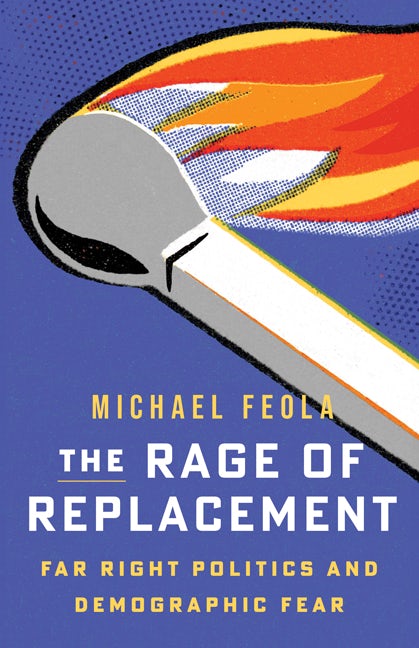Prof. Michael Feola releases new book, The Rage of Replacement

Michael Feola
Michael Feola, associate professor, government and law
The Rage of Replacement: Far Right Politics and Demographic Fear, published by University of Minnesota Press
Released: July 30, 2024
The Rage of Replacement, a summary:
The Rage of Replacement traces how the “Great Replacement” narrative has shaped far-right extremism and propelled dangerous political projects and acts of violence. The Great Replacement narrative, which imagines that historic white majorities are being intentionally replaced through immigration policies, has mobilized racist, nationalist, and nativist movements in the United States and Europe. The Rage of Replacement tracks how this narrative has shaped the far right, binding its various camps into a community of rage obsessed with nostalgia for a white-supremacist past.
 Showing how the replacement narrative has found significant purchase in mainstream political discourse through the rise of Trumpism, major right-wing media figures, and events such as 2017’s “Unite the Right” rally in Charlottesville, Virginia, Michael Feola diagnoses the dangers this theory poses as it shapes the far-right imagination and expands through civil society. In particular, he tracks how the replacement narrative has motivated toxic political strategies intended to “take back” the nation from its perceived enemies—by force if deemed necessary.
Showing how the replacement narrative has found significant purchase in mainstream political discourse through the rise of Trumpism, major right-wing media figures, and events such as 2017’s “Unite the Right” rally in Charlottesville, Virginia, Michael Feola diagnoses the dangers this theory poses as it shapes the far-right imagination and expands through civil society. In particular, he tracks how the replacement narrative has motivated toxic political strategies intended to “take back” the nation from its perceived enemies—by force if deemed necessary.
Identifying the Great Replacement narrative as a central force behind the rise and expansion of far-right extremism, Feola shows how it has motivated a variety of dangerous political projects. From calls for the creation of segregated white ethnostates to extremist violence such as the mass shootings in Christchurch, El Paso, and Buffalo, The Rage of Replacement makes clear that replacement theory poses a dire threat to democracy and safety.
Where is it available?
The book is available in the usual book formats (both hardcover and paperback). And it is also available as an e-book or audiobook. It can be purchased on the publisher site, University of Minnesota Press. And it is available on all the major online platforms: Amazon, Bookshop.org, Barnes & Noble, Apple, and so forth.
Why did you write this book, and why should people at Lafayette and beyond read it?
I wrote this book because narratives of racial or cultural “replacement” have fueled the recent rise of the far right. The nations of Europe and North America have been roiled by growing forces of nativism and xenophobia. And fears over population/cultural change have been routinely exploited to drive these commitments. At worst, these fears have given rise to spectacular acts of mass violence by extremists who cite a so-called “great replacement” as their motivation.
People should read this book because of the dangerous role that the politics of demographic fear plays in our political culture. The book details some of the historical roots of this far-right belief and tracks its many political expressions. In doing so, the book explores how these “replacement” fears intersect with other far-right commitments—for instance, its deep anti-feminism and its rejection of human equality.
Perhaps most importantly, the book diagnoses the civic costs to this far-right demographic panic —particularly its connection to white nationalism and white supremacy. These are malignant currents that any multiethnic democracy will need to grapple with in our troubled political moment.
How will this research impact your work and/or classroom at Lafayette?
This research is already influencing my teaching at Lafayette. I currently teach a course The Radical Right, which addresses many of the themes explored in the book. If you want to understand why the far right continues to grow and spread across the global stage, it is necessary to address how its central figures have weaponized fears over immigration and national identity. And, for far-right recruitment, there is no fear more potent than the belief that one’s nation is being taken from its proper “owners” and given to others.
I also teach some of this material in my courses that address how citizenship and nationhood have been disrupted through globalization. The writing of this book, however, has significantly enriched my sense of how the changes linked to globalization have spawned such powerful, reactionary forces in nation after nation. These are hugely important questions for students to grapple with if they are to enter the world as engaged, informed citizens.